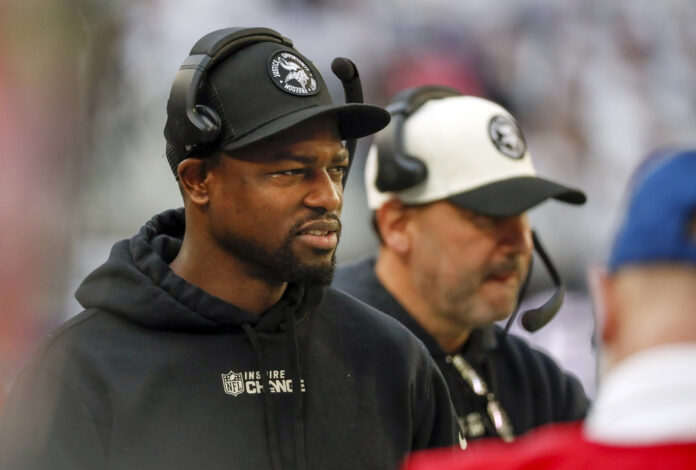
EAGAN, Minn. (AP) — Matt Daniels acknowledged feeling “just a tad bit” of butterflies when he sat down earlier this week for speed-dating-style meetings with NFL owners and executives as part of the league’s strategy for developing more diversity in the coaching ranks.
With just one season on his resume as Minnesota Vikings special teams coordinator, the 33-year-old Daniels could have been forgiven if he were daunted by the pressure of selling himself to these decision-makers in 30-minute time slots.
But all Daniels had to do was be his usual engaging and energetic self.
“What you realize is these billionaires and these high-influence major powers, they’re just normal people who enjoy and love football,” Daniels said.
The relative lack of minority-race coaches in prominent leadership roles, starting with the big stage of being a head coach, has been a long-running problem for the league and thus a more recent priority to address. Filling the pipelines with more diverse candidates has been one of the goals, including the creation of “accelerator” programs for front office and coaching jobs.
At the spring league meetings in Minnesota this week, a pool of 40 coaches participated in the latest edition. Sixteen of them took part in the inaugural event a year ago, after which eight coaches and three executives were hired in new roles, including Tennessee Titans general manager Ran Carthon.
The roster this week included veterans such as Leslie Frazier and Anthony Lynn, who’ve previously been head coaches and still aspire for the top job.
“They’re at different places and times and in their career,” said Jonathan Beane, the chief diversity and inclusion officer for the NFL. “Our agenda needs to fit that and needs to make sure that someone like a Leslie Frazier is getting a lot out of it and make sure that someone else who might be very early in their career, a positional coach, that they’re getting a lot out of it, too.”
For an up-and-comer like Daniels who works in the specialized area of special teams, the opportunity to introduce himself to more people in charge was as valuable as any.
“Exposure leads to expansion,” said Vikings defensive coordinator Brian Flores, who filed last year a still-pending lawsuit against the league alleging racist hiring practices after being fired as head coach of the Miami Dolphins. “Once guys are exposed to certain people, certain situations, you grow.”
There are currently six minority head coaches, three Black, among the 32 positions in the NFL. Being able to shake more hands alone is not going to boost the rate, but every initiative has to start somewhere.
“This is a relationship business, so guys are going to hire who they trust,” Daniels said. “The more you put yourself out there, the more you’re able to be seen and be heard, that’s kind of where change starts to happen. It’s easy to kind of be hush-hush about certain situations or certain things just because you might ruffle a little feathers, but someone’s got to do it.”
Vikings wide receivers coach Keenan McCardell was another participant in the three-day session. The networking with each other and with the higher-ups was vital, but there were other components the league has added based on feedback from the pilot participants.
Trace Armstrong, a former NFL player and current coach agent, provided perspective about the contract side of the business. Dean Stamoulis, a search firm executive, was there to speak about the hiring process. Don Thompson, the former chief executive of McDonald’s, brought inspiration as a trail-blazing Black leader in the restaurant business.
“He told us, ‘You can play the game, but you’ve still got to be yourself,’” McCardell said. “I think everybody picked up on that, and when we were ourselves to the owners, they enjoyed it.”
Charles London, who was hired this offseason as pass game coordinator and quarterbacks coach for the Titans, interviewed with head coach Mike Vrabel for their offensive coordinator position. He participated in the accelerator program last year.
“What’s key for me is feedback. So if I don’t get this job, that’s great, but give me the feedback. Tell me what I can do better, what I can do here,” London said.
The Titans also sent tight ends coach Tony Dews, who coached running backs last year, to Minnesota this week. Vrabel sent Dews and London a text message each morning during the session, which forced them to miss some spring practices with the Titans.
“I just said, ‘Hey, we miss you, but make sure that you guys do a great job up there and present yourselves the way that you want everybody to see you,’” Vrabel said.
Commissioner Roger Goodell acknowledged the NFL has “more work to do” but called the accelerator program another “good step” toward addressing a decades-old issue.
“Diversity makes us better,” Goodell said. “We saw that with 40 of our participants here. They’re incredibly talented, gifted, and they’ll make a difference in the NFL.”


